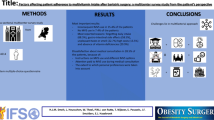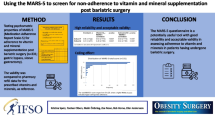Abstract
Background
Nutritional supplementation is recommended as a prophylactic strategy for nutritional deficiencies after bariatric surgery. Little is known regarding compliance and patients’ perspectives. The purpose of the study was to explore supplement intake, compliance, and patients’ perspectives (including barriers, facilitators, and beliefs) and to examine whether compliance to nutritional supplementation can be predicted after bariatric surgery.
Material and Methods
A questionnaire was developed to explore supplement intake and patients’ perspectives. The Probabilistic Medication Compliance Scale (ProMAS) was included and modified to measure behaviors related to supplementation compliance. Content validity was assessed with an expert and patient panel. Consequently, a cross-sectional survey was conducted among patients that underwent bariatric surgery, who were invited using social media. Descriptive statistics and Spearman correlations were applied. Multiple linear regression analysis was performed to predict compliance.
Results
A 58-item questionnaire was developed and content validated, resulting in a scale-content validity index of 0.93. The questionnaire was completed by 402 subjects. Sixty-nine subjects reported not consuming any nutritional supplement (n = 69; 17.2%). For the supplement users (n = 333; 82.8%), a median ProMAS sum score of 11.0 (7.0–15.0) was observed. Increasing age and medicine intake were positive predictors of compliance (age: B = 0.058, p = 0.01; medicine intake: B = 0.39, p < 0.001), while experiencing barriers was identified as a negative predictor of compliance (B = − 4.637, p < 0.001). Top three barriers for supplement use were forgetfulness (n = 118; 29.4%), too expensive (n = 91; 22.6%), and experiencing side effects (n = 61; 15.2%).
Conclusion
Lifelong nutritional supplementation is essential after bariatric surgery, but compliance can be affected by the presence of barriers.
Graphical abstract




Similar content being viewed by others
References
Bal BS, Finelli FC, Shope TR, Koch TR. Nutritional deficiencies after bariatric surgery. Nat Rev Endocrinol. 2012;8(9):544–56.
Ledoux S, Flamant M, Calabrese D, Bogard C, Sami O, Coupaye M. What are the micronutrient deficiencies responsible for the most common nutritional symptoms after bariatric surgery? Obes Surg. 2020;30(5):1891–7.
Corbeels K, Verlinden L, Lannoo M, Simoens C, Matthys C, Verstuyf A, et al. Thin bones: vitamin D and calcium handling after bariatric surgery. Bone Rep. 2018;8:57–63.
Busetto L, Dicker D, Azran C, Batterham RL, Farpour-Lambert N, Fried M, et al. Practical recommendations of the Obesity Management Task Force of the European Association for the study of obesity for the post-bariatric surgery medical management. Obes Facts. 2017;10(6):597–632.
Parrott J, Frank L, Rabena R, Craggs-Dino L, Isom KA, Greiman L. American Society for Metabolic and Bariatric Surgery integrated health nutritional guidelines for the surgical weight loss patient 2016 update: micronutrients. Surg Obes Relat Dis. 2017;13(5):727–41.
Mechanick JI, Apovian C, Brethauer S, Timothy Garvey W, Joffe AM, Kim J, et al. Clinical practice guidelines for the perioperative nutrition, metabolic, and nonsurgical support of patients undergoing bariatric procedures - 2019 update: cosponsored by American Association of Clinical Endocrinologists/American College of Endocrinology, The Obesity Society, American Society for Metabolic and Bariatric Surgery, Obesity Medicine Association, and American Society of Anesthesiologists. Obesity (Silver Spring). 2020;28(4):O1–58.
Heber D, Greenway FL, Kaplan LM, Livingston E, Salvador J, Still C, et al. Endocrine and nutritional management of the post-bariatric surgery patient: an Endocrine Society Clinical Practice Guideline. J Clin Endocrinol Metab. 2010;95(11):4823–43.
Dogan K, Homan J, Aarts EO, de Boer H, van Laarhoven C, Berends FJ. Long-term nutritional status in patients following Roux-en-Y gastric bypass surgery. Clin Nutr. 2018;37(2):612–7.
Ledoux S, Calabrese D, Bogard C, Dupre T, Castel B, Msika S, et al. Long-term evolution of nutritional deficiencies after gastric bypass: an assessment according to compliance to medical care. Ann Surg. 2014;259(6):1104–10.
World Health Organization. Adherence to long-term therapies: evidence for action. 2003.
Sherf Dagan S, Goldenshluger A, Globus I, Schweiger C, Kessler Y, Kowen Sandbank G, et al. Nutritional recommendations for adult bariatric surgery patients: clinical practice. Adv Nutr. 2017;8(2):382–94.
Karmali S, Brar B, Shi X, Sharma AM, de Gara C, Birch DW. Weight recidivism post-bariatric surgery: a systematic review. Obes Surg. 2013;23(11):1922–33.
Zarshenas N, Tapsell LC, Neale EP, Batterham M, Talbot ML. The relationship between bariatric surgery and diet quality: a systematic review. Obes Surg. 2020;30(5):1768–92.
Modi AC, Zeller MH, Xanthakos SA, Jenkins TM, Inge TH. Adherence to vitamin supplementation following adolescent bariatric surgery. Obesity (Silver Spring). 2013;21(3):E190–5.
Brorsson AL, Nordin K, Ekbom K. Adherence to vitamin supplementation recommendations in youth who have undergone bariatric surgery as teenagers: a mixed methods study. Obes Surg. 2020;30(12):4911–8.
Mahawar KK, Clare K, O’Kane M, Graham Y, Callejas-Diaz L, Carr WRJ. Patient perspectives on adherence with micronutrient supplementation after bariatric surgery. Obes Surg. 2019;29(5):1551–6.
Smelt HJM, Pouwels S, Smulders JF, Hazebroek EJ. Patient adherence to multivitamin supplementation after bariatric surgery: a narrative review. J Nutr Sci. 2020;9:e46.
Neff KJ, le Roux CW. Primum non nocere-first, do no harm with bariatric surgery. Lancet Diabetes Endocrinol. 2021.
Stefanidis D, King WC, Puzziferri N, Butler AR, Hutter M, Sudan R. Development of ASMBS research agenda for bariatric surgery using the Delphi methodology. Surg Obes Relat Dis. 2019;15(9):1563–9.
Patrick DL, Burke LB, Gwaltney CJ, Leidy NK, Martin ML, Molsen E, et al. Content validity–establishing and reporting the evidence in newly developed patient-reported outcomes (PRO) instruments for medical product evaluation: ISPOR PRO good research practices task force report: part 1–eliciting concepts for a new PRO instrument. Value Health. 2011;14(8):967–77.
Patrick DL, Burke LB, Gwaltney CJ, Leidy NK, Martin ML, Molsen E, et al. Content validity–establishing and reporting the evidence in newly developed patient-reported outcomes (PRO) instruments for medical product evaluation: ISPOR PRO Good Research Practices Task Force report: part 2–assessing respondent understanding. Value Health. 2011;14(8):978–88.
Polit DF, Beck CT. Nursing research: principles and methods. 7th ed2004.
Boateng GO, Neilands TB, Frongillo EA, Melgar-Quinonez HR, Young SL. Best practices for developing and validating scales for health, social, and behavioral research: a primer. Front Public Health. 2018;6:149.
Stjernqvist NW, Elsborg P, Ljungmann CK, Benn J, Bonde AH. Development and validation of a food literacy instrument for school children in a Danish context. Appetite. 2021;156:104848.
Kleppe M, Lacroix J, Ham J, Midden C. The development of the ProMAS: a Probabilistic Medication Adherence Scale. Patient Prefer Adherence. 2015;9:355–67.
Van den Heede K, Ten Geuzendam B, Dossche D, Janssens S, Louwagie P, Vanderplanken K, Jonckheer P. Bariatric surgery in Belgium: organisation and payment of care before and after surgery. Health Services Research
(HSR) Brussels: Belgian Health Care Knowledge Centre (KCE). 2020. KCE Reports 329. D/2020/10.273/06.
Polit DF, Beck CT, Owen SV. Is the CVI an acceptable indicator of content validity? Appraisal and recommendations Res Nurs Health. 2007;30(4):459–67.
DuBay WH. The Principles of Readability. Costa Mesa, California; 2004.
Johansson K, Svensson PA, Soderling J, Peltonen M, Neovius M, Carlsson LMS, et al. Long-term risk of anaemia after bariatric surgery: results from the Swedish Obese Subjects study. Lancet Diabetes Endocrinol. 2021;9(8):515–24.
Osterberg L, Blaschke T. Adherence to medication. N Engl J Med. 2005;353(5):487–97.
Hood MM, Corsica J, Bradley L, Wilson R, Chirinos DA, Vivo A. Managing severe obesity: understanding and improving treatment adherence in bariatric surgery. J Behav Med. 2016;39(6):1092–103.
Haute Autorité de Santé. Obesity surgery in adults. 2009.
Steenackers N, Vanuytsel T, Augustijns P, Tack J, Mertens A, Lannoo M, et al. Adaptations in gastrointestinal physiology after sleeve gastrectomy and Roux-en-Y gastric bypass. Lancet Gastroenterol Hepatol. 2021;6(3):225–37.
Claxton AJ, Cramer J, Pierce C. A systematic review of the associations between dose regimens and medication compliance. Clin Ther. 2001;23(8):1296–310.
Ahmed K, Penney N, Darzi A, Purkayastha S. Taste changes after bariatric surgery: a systematic review. Obes Surg. 2018;28(10):3321–32.
Merolli M, Gray K, Martin-Sanchez F. Health outcomes and related effects of using social media in chronic disease management: a literature review and analysis of affordances. J Biomed Inform. 2013;46(6):957–69.
Acknowledgements
We would like to thank all experts that participated in the process of developing the questionnaire.
Author information
Authors and Affiliations
Corresponding author
Ethics declarations
Ethics Approval and Consent to Participate
All procedures performed in studies involving human participants were in accordance with the ethical standards of the institutional research committee and with the 1964 Helsinki declaration and its later amendments or comparable ethical standards. The research has been evaluated and approved by Education-Support Committee (MP014674). Informed consent was obtained from all individual participants included in the study.
Conflict of Interest
The authors declare no competing interests.
Additional information
Publisher’s Note
Springer Nature remains neutral with regard to jurisdictional claims in published maps and institutional affiliations.
Key Points
1. Nutritional supplementation compliance is low with 17.2% not consuming supplements.
2. Increasing age, increasing medicine intake and experiencing barriers predict compliance.
3. Top three reported barriers are forgetfulness, too expensive and side effects.
4. Health care professionals, systems and researchers should address barriers and side effects.
Rights and permissions
About this article
Cite this article
N, S., S, V., T, B. et al. Compliance and Patients’ Perspectives Towards Nutritional Supplementation Following Bariatric Surgery. OBES SURG 32, 1804–1813 (2022). https://doi.org/10.1007/s11695-022-06047-3
Received:
Revised:
Accepted:
Published:
Issue Date:
DOI: https://doi.org/10.1007/s11695-022-06047-3




